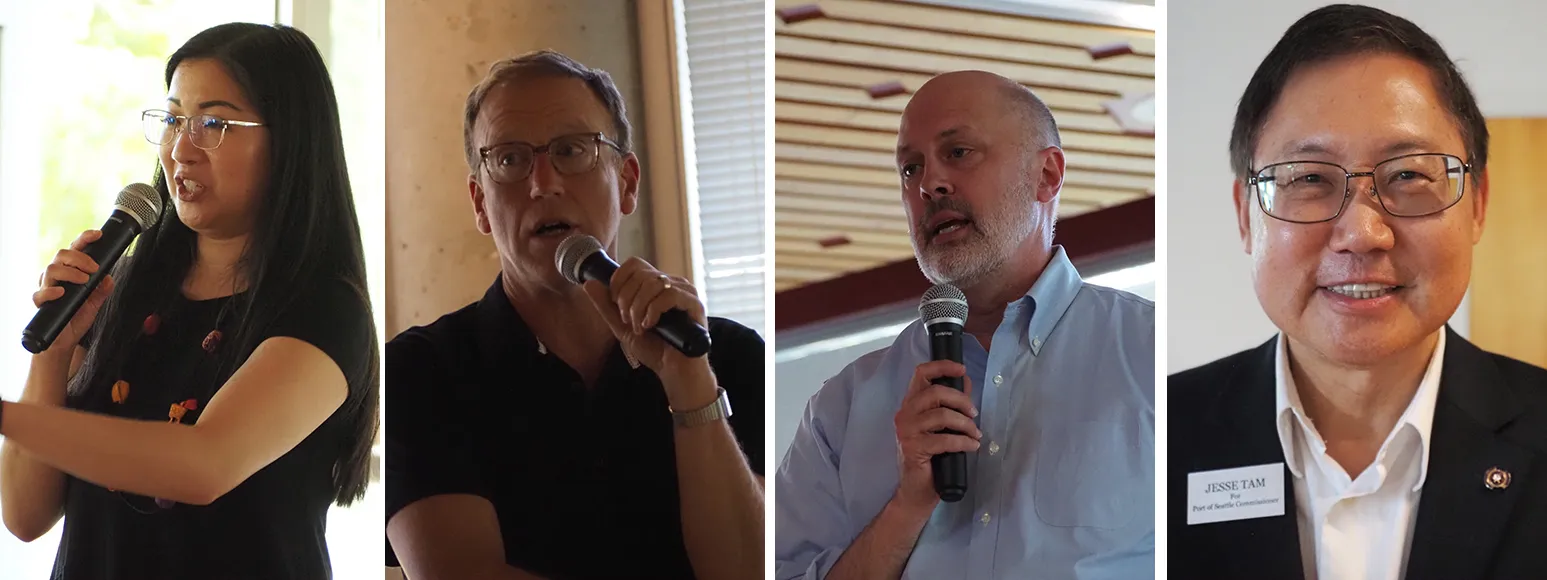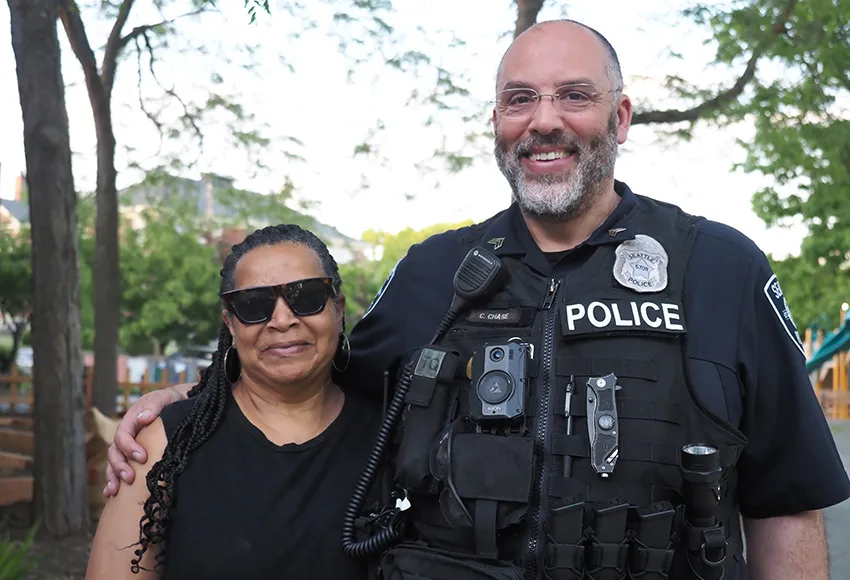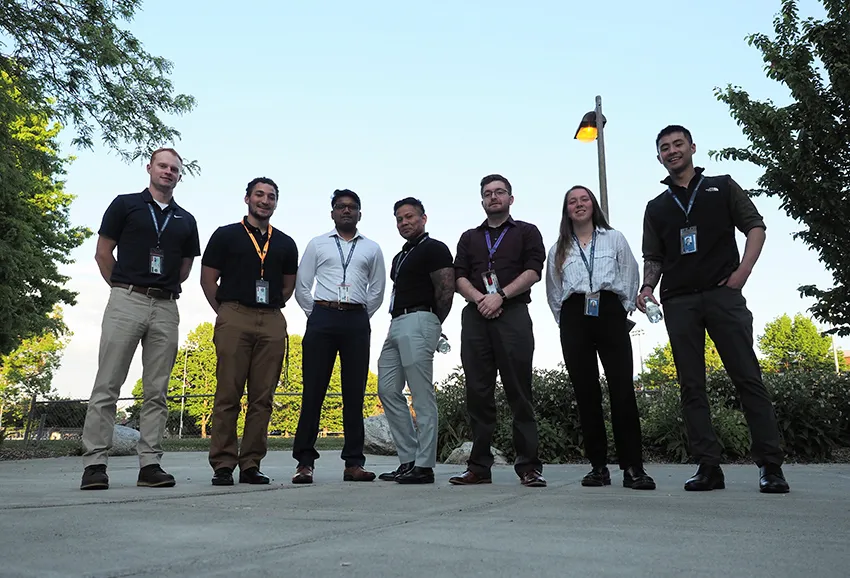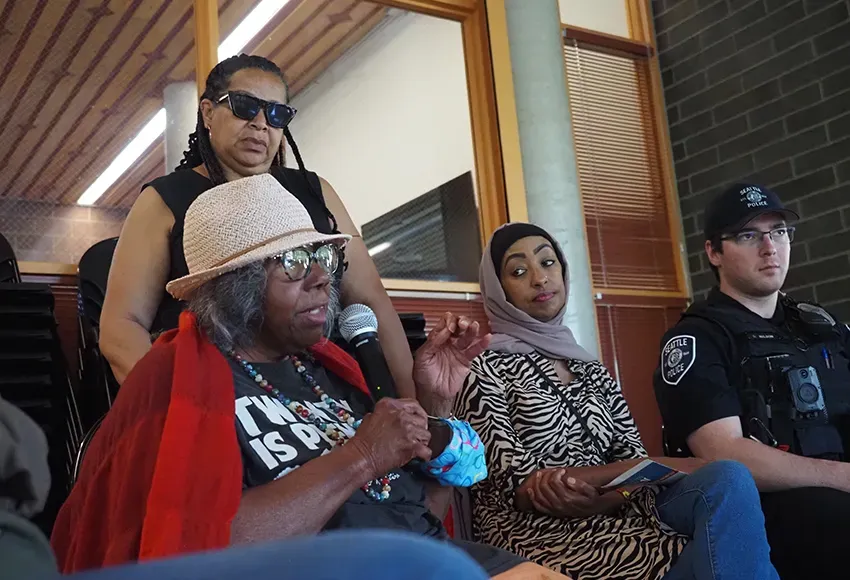On May 18, the African American Community Advisory Council to the Seattle Police Department (SPD) held a meeting at Garfield Community Center to allow the public to meet candidates running for Seattle City Council and Port of Seattle commissioner positions.

The candidates present were Tanya Woo, running for City Council from District 2, Pete Hanning from District 6, Bob Kettle from District 7, and Jesse Tam, running for Port of Seattle Commissioner, as well as a representative for Joy Hollingsworth, who is aiming to be the District 3 City Council member. They each spoke about their respective backgrounds and priorities, gave their thoughts on the concerns brought up by attendees, and answered questions directly.
Woo's priorities include affordable housing, the homelessness crisis, safety, and access to transportation. Hanning's priorities are homelessness, safety for neighborhoods and small businesses, affordable housing, upgrading aging infrastructure, economic vitality, and maintaining civility. Kettle wants improvements to public safety, homelessness, and the local economy. Tam's priorities are transparency, utilizing his business experience, support of union workers, and protecting the environment. Hollingsworth is campaigning on safety, affordable housing, investing in underrepresented small business owners, access to transportation, and investment in community enrichment programs, such as neighborhood gardens.
The current Fentanyl crisis was brought up, and the SPD officers in attendance agreed that the rise in crime is not being helped by the proliferation of the drug. Mother Walden spoke on the dangers to young people who want to experiment but, unbeknownst to them, are being given laced substances that substantially increase the likelihood of addiction and overdose. Another person referenced the recent passing of a drug possession law here in Washington and asked whether criminalizing possession will benefit the community.
Woo and Hanning expressed how the city needs to invest in addiction specialists and care. Woo spoke about how there needs to be more support for "community-based policing alternatives" through which people experiencing addiction can be connected to resources and services. (The new law, enforceable as of July 1, includes the option for those charged to be part of a substance use disorder treatment program in exchange for the state dismissing the charge.)
An attendee asked the candidates whether they support the ShotSpotter gunfire detection system that was canceled last year amid concerns over its efficacy. Kettle stated that he was in favor of the system, and Woo said she would "need more information" before answering.
The ShotSpotter system has been adopted in many other states, such as California and New York, with much controversy. It is designed to recognize gunshots and to alert the police, but those opposed to it say that it does not make their communities safer. Critics argue that when the system falsely reports a gunshot, the police will rush into a peaceful neighborhood, expecting a potentially deadly conflict.

Policing and gun violence
This was also an opportunity to discuss policing and police accountability. Three officers in full uniform were in attendance. After everyone was seated in a circle and introductions were given, the chair of the advisory board, Victoria Beach, prompted the officers to explain why they came to the meeting in their on-duty uniforms.
The officers said they had just finished a call about a shooting in the area. A 19-year-old had been the victim of a shooting in the Garfield High School parking lot. The victim, who was not a student, suffered a bullet wound to the leg but was in stable condition.
One officer said that "gun violence is the big issue right now" and that short-staffing in the SPD puts everyone "on a dangerous bridge" with the shootings across the city, adding that "to lower the standards to get more hires is a terrible idea" and that the SPD is committed to helping repair trust by ensuring they maintain strict hiring practices.

Among the attendees were recruits currently enrolled in Before the Badge (BTB), a first-of-its-kind program currently only practiced by the SPD, though other departments around the country are considering adopting it. The training program aims to teach recruits a "comprehensive understanding of the people they will eventually swear to serve and protect. Because of BTB, recruits will first build relationships with the people of Seattle – before they receive their badges."
Concerning the current Seattle City Council, an officer stated that "for the past four years, it feels like there has been no dialogue" between it and the SPD.
The shooting about two and half hours before the meeting and only a block away weighed on the attendees' minds. Rev. Harriett Walden of Mothers for Police Accountability spoke on the matter, saying, "The silence is deafening when children are losing their lives" to gun violence and the SPD.
The focus shifted to the City Council, and Rev. Walden, who goes by Mother Walden, said that she believes that "the City Council let the city down" and that the community has yet to be genuinely heard.
After the discussion with the candidates, the meeting came to a close with an announcement by Mother Walden about the next Mothers of Police Accountability meeting on May 31 at 6 p.m. at the South Seattle Liberty Bank. The next African American Community Advisory Council meeting has yet to be announced.


